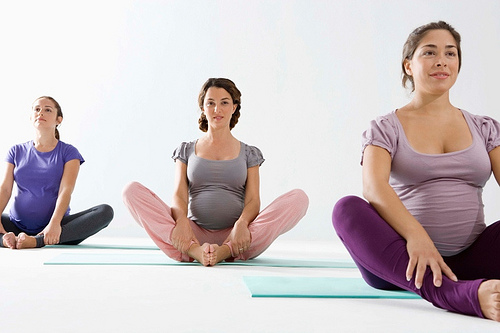Why should I avoid getting too hot when I'm exercising?
Getting too hot at any stage of your pregnancy can make you feel faint and dizzy, and may be harmful to your growing baby.
It's especially important not to get too hot in your first trimester, when your body isn't as good at regulating its own temperature.
To be on the safe side, keep as cool as you can when you're exercising, and drink plenty of water.
Will it affect my baby if I get too hot when I'm exercising?
We don't know for certain if overheating can harm babies in the uterus (womb). However, studies on animals suggest that it may cause birth defects in their offspring, especially in the early months.
These birth defects may affect the brain and spine (neural tube defects). Spina bifida, for example, is an NTD.

How can I stay cool during exercise?
These steps make overheating during exercise less likely:
1. Don't do strenuous exercise for long periods if it's hot or humid.
2. Wear thin layers of clothes, so you can remove them as you warm up.
3. Drink plenty of fluids. Dehydration can raise your body temperature, so drink plenty of water before you start and during your workout. Keep a bottle of water close by, and take regular sips.
4. Don't push yourself too hard, and slow down if you begin to feel too hot, dizzy or faint or experience any sort of discomfort. If you are sweating excessively you should also stop, even if you feel OK. Pay attention to how you feel, rather than by checking what your heart rate is. You should be able to have a normal conversation while exercising.
5. Stick to low-impact exercise, which is less likely to raise your body temperature. Keep your exercise sessions (that aren't classes) to no longer than 45 minutes at a time.
How likely is it that I'll overheat in pregnancy?
Most experts agree that exercise during pregnancy is unlikely to cause your body temperature to rise, unless it's very strenuous, or you exercise when it's very hot and humid.
Don't use steam rooms, hot tubs, saunas and spa baths either before or after your exercise session, or at any time in pregnancy. These can raise your body temperature much higher than its normal level.
If you're worried, and want to take your temperature to make sure, it should be less than 102.5 degrees F after exercising. Place a thermometer in your armpit and hold it under your arm for a few minutes before taking a reading. Though as long as you feel comfortable after exercising, this is not usually necessary.
Rest assured that you're unlikely to overheat when you exercise, unless the exercise is very strenuous, or you exercise in very hot or humid conditions. When we sweat, our body is usually very effective at cooling itself down.








